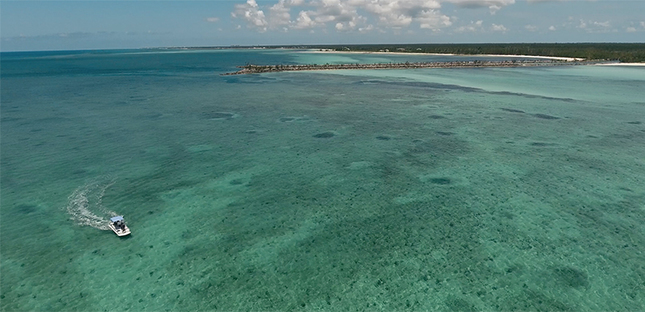
Harry Lee / Coral Vita
The main canal entrance on the south side of Grand Bahama Island, home of Coral Vita.
View full image

Harry Lee / Coral Vita
The main canal entrance on the south side of Grand Bahama Island, home of Coral Vita.
View full image
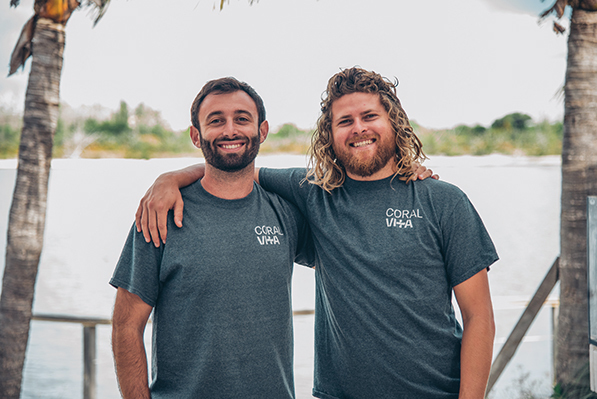
Harry Lee / Coral Vita
Sam Teicher ’12, ’15MEM (right) and Gator Halpern ’15MEM (left) started the world’s first commercial land-based coral farm dedicated to reef restoration, Coral Vita.
View full image

Harry Lee / Coral Vita
Sam Teicher ’12, ’15MEM (right) and Gator Halpern ’15MEM (left) started the world’s first commercial land-based coral farm dedicated to reef restoration, Coral Vita.
View full image

Harry Lee / Coral Vita
Coral Vita’s dive team heads out to do some reef maintenance.
View full image

Harry Lee / Coral Vita
Coral Vita’s dive team heads out to do some reef maintenance.
View full image
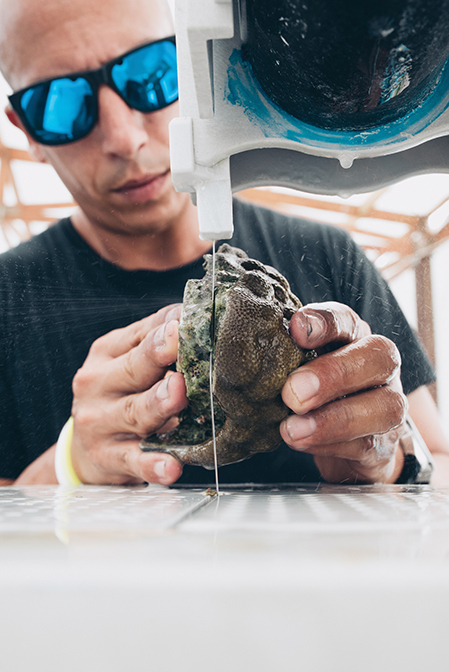
Harry Lee / Coral Vita
Coral Vita Aquaculture Director Amir Matouk creates a flat surface on the bottom of a Porites astreoides—a mustard hill coral—to attach it to a coral “cookie,” part of the process of making a parent colony.
View full image

Harry Lee / Coral Vita
Coral Vita Aquaculture Director Amir Matouk creates a flat surface on the bottom of a Porites astreoides—a mustard hill coral—to attach it to a coral “cookie,” part of the process of making a parent colony.
View full image
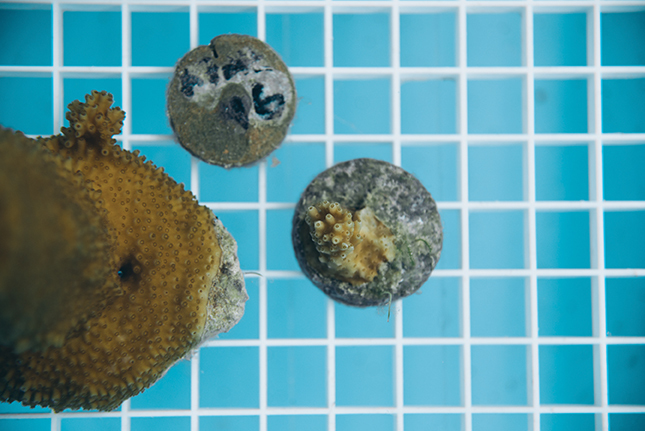
Harry Lee / Coral Vita
Elkhorn coral microfragments acclimatize in a land-based coral tank before being placed back in the sea.
View full image

Harry Lee / Coral Vita
Elkhorn coral microfragments acclimatize in a land-based coral tank before being placed back in the sea.
View full image
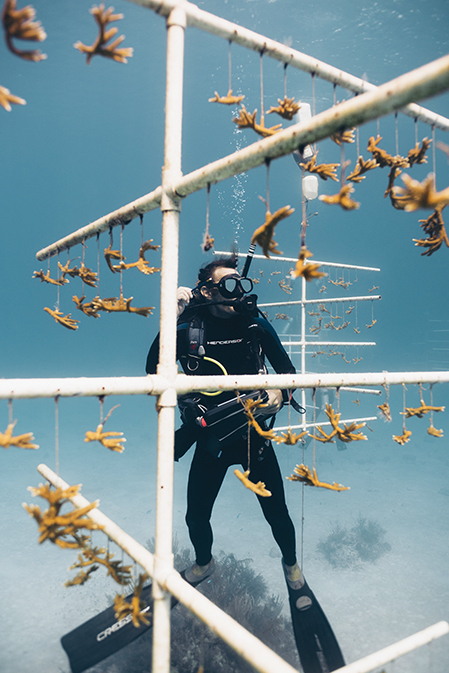
Harry Lee / Coral Vita
Water operations director Joe Oliver checks on one of Coral Vita’s ocean coral trees.
View full image

Harry Lee / Coral Vita
Water operations director Joe Oliver checks on one of Coral Vita’s ocean coral trees.
View full image
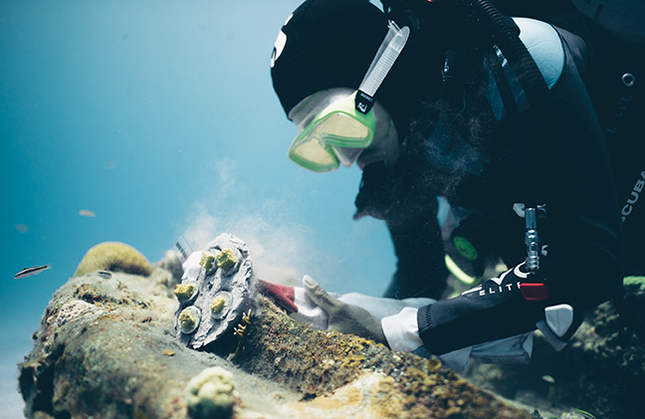
Harry Lee / Coral Vita
A coral “cookie” is attached with marine cement. The cookie will provide a structure for the microfragments of coral to fuse together, a key part of the Coral Vita process.
View full image

Harry Lee / Coral Vita
A coral “cookie” is attached with marine cement. The cookie will provide a structure for the microfragments of coral to fuse together, a key part of the Coral Vita process.
View full image
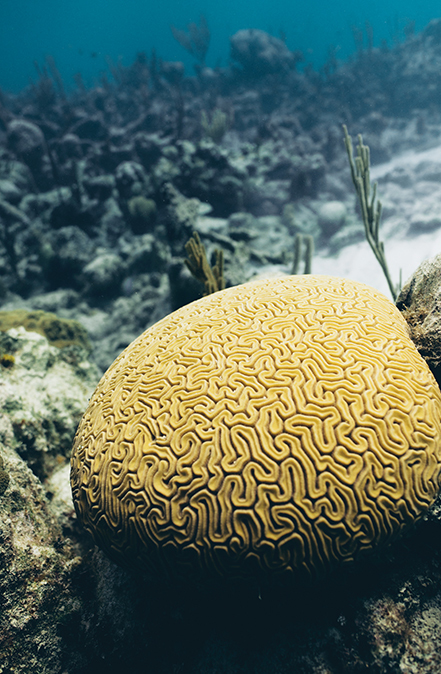
Harry Lee / Coral Vita

Harry Lee / Coral Vita

Harry Lee / Coral Vita
The Coral Vita team celebrates winning the inaugural Earthshot Prize in fall 2021, for producing an innovative solution to the climate crisis.
View full image

Harry Lee / Coral Vita
The Coral Vita team celebrates winning the inaugural Earthshot Prize in fall 2021, for producing an innovative solution to the climate crisis.
View full image
Sam Teicher ’12, ’15MEM, had two options for how to spend a gap year before grad school. With his political science degree, he figured he could find a job at an NGO or think tank back home in DC. On the other hand, he’d had an invitation from a Yale classmate to work at his nonprofit in Mauritius. “I chose the tropical island,” says Teicher. He’d been fascinated by the sea ever since a childhood visit to Hawaii, and he got scuba certification at age 13.
On that tropical island, Teicher started coral farming. In partnership with the Mauritius Oceanography Institute, he helped organize a UN–funded program to plant five thousand healthy coral colonies in an ailing reef in the Indian Ocean. At a nearby reef that had been restored, the fish had returned. “I saw that we could bring the reefs back to life,” he says.
But Mauritius is just a pinprick on the world map of tropical reefs, and almost everywhere, reefs are dying. Since 1970, ocean acidification, heat spikes in surface water, and other insults have killed more than half the world’s reefs. The Intergovernmental Panel on Climate Change predicts that even if we manage to limit the rise in global temperatures to 1.5 degrees Celsius above preindustrial levels, we risk losing 70 percent to 90 percent of reefs by 2050. Teicher came to believe that in Mauritius alone, fully reviving the reefs would have required not five thousand, but closer to five million farmed corals—every year. He realized that restoration projects dependent on donations or grants couldn’t keep pace with this global decline. He began to consider whether a for-profit business could do more.
Nine years later, Teicher and Gator Halpern ’15MEM are running the world’s first commercial land-based coral farming company dedicated to reef restoration.
Located in The Bahamas, Coral Vita has attracted nearly $4 million in investments and venture capital, along with $3 million in prizes and grants. In September 2021, Coral Vita won £1 million: the grand prize in the “Revive Our Oceans” category of the Earthshot Prize, established by Prince William, Duke of Cambridge.
When Teicher left Mauritius for Yale in 2013 to work toward a master’s in environmental management, he didn’t know where his studies would take him. Coral was one interest of many. He credits his immersion in the world of coral to two things: finding a brainstorming partner (and friend) among his classmates in the School of the Environment, and a $1,000 grant from the Yale Entrepreneurial Institute.
Teicher met Halpern in their first year, when they both applied to a business planning course at the School of Management. Neither got in. But they had similar interests—Halpern had studied aquaculture in the Peruvian Amazon—and they started trading ideas about entrepreneurship. The conversations continued when they shared a house the next year. Coral reefs kept coming up. Could reviving reefs actually be a viable business plan?
They knew that reefs are important to the global economy, biodiversity, and humanity. Nearly a billion people depend on the reefs for their livelihoods in fishing, tourism, and more. The reefs also protect shoreline communities during storms, reducing wave energy by an average of 97 percent. Losing coral reefs would be catastrophic for ocean ecosystems, and therefore for economies, because reefs serve as home base for a quarter of marine life. Climate change, notes Teicher, “is one of the greatest strategic and moral challenges facing humanity.”
SOM’s business planning class accepted Halpern and Teicher the next fall. By then they knew they wanted to start a business that restores reefs. When they got the $1,000 from the Yale Entrepreneurial Institute, they used it to meet with an expert on coral propagation. Two plane tickets to Florida and a car rental ate up the grant, so they slept in the car. “It worked out better for me than Gator,” says Teicher, “because I was apparently snoring quite a bit.” They drove south to the Mote Marine Laboratory in the Florida Keys to meet scientist David E. Vaughan. He was pioneering a method called microfragmentation, which accelerates the growth of certain corals as much as fifty-fold.
Teicher and Halpern already understood the basics of coral biology. Reef-building (hard) corals are tiny soft-bodied animals called polyps. They live in colonies. Inside their tissues, single-cell photosynthetic algae provide them with nutrients. The polyps secrete calcium carbonate to produce the stony frameworks that we recognize as reefs. (Soft corals, like sea fans, don’t build reefs.)
Vaughan showed Halpern and Teicher how he gathered broken corals from the sea floor, cut them into pieces smaller than a thumb, then grew them in saltwater tanks. The process of fragmentation speeds up growth: growth that would have taken roughly 20 to 100 years in the sea required closer to 6 to 24 months.
Halpern and Teicher now use this method at their coral farm.
In summer 2015, Teicher and Halpern were chosen for an accelerator program run by the Yale Entrepreneurial Institute (now part of the Tsai Center for Innovative Thinking at Yale). Their business plan identified people and operations that might hire a company to restore coral reefs: fisheries, port authorities, coastal property owners, resorts, cruise companies, ecotourism operators. Insurance companies are also very aware that reefs provide storm protection. Halpern and Teicher would later discover that the research branch of the US Department of Defense was already interested in developing reefs to fortify 1,700 military installations. “The insurance industry and the US defense department are two groups that don’t come to mind when you think ‘progressive environmentalist,’” says Teicher, “but they understand the risks and are motivated to act.”
The cofounders incorporated their company soon after graduating. They got their first investor in early 2016, and then a second, thanks to one of their summer accelerator mentors. Soon after, Yale’s Innovation Fund invested $100,000 into Coral Vita. The two men set up company headquarters on Grand Bahama, the second most populated of the inhabited islands of The Bahamas. By spring 2019, they were operating the farm, pumping filtered seawater into 30 blue fiberglass tanks filled with rows of microfragmented coral.
Three months later, on September 1, Hurricane Dorian stalled over Grand Bahama with sustained winds of 185 miles per hour. Half the island was submerged—because The Bahamas had already lost 80 percent of its reefs. At Coral Vita, a 17-foot tidal surge swept away almost all 30 blue fiberglass tanks, along with the coral growing in them. “We experienced the climate crisis firsthand,” says Teicher.
He helped support a group of people who had boats and could rescue islanders from roofs and attics. For the three months that followed, Teicher, Halpern and the other Coral Vita staffers worked with aid groups like World Central Kitchen. Along the way, they retrieved 19 of their 30 fiberglass coral tanks. They found one tank 35 miles away from their farm.
The storm affirmed Coral Vita’s place in the community, says Jeri Kelly, who works at The Bahamas’ Ministry of Agriculture and Marine Resources. When a foreign organization moves into a small community, she says, “it can be challenging.” But Coral Vita employs Bahamians, and moreover, the business “can be defined as sustainable. They survived Hurricane Dorian. Their place was wiped out, and they built back.” In 2021, Kelly helped negotiate Coral Vita’s first contract, with the Bahamian government, to restore a reef not far from the Coral Vita office.
These days, Coral Vita’s 11-member staff grows up to 30,000 corals annually, with space to grow many more and with hope of establishing farms around the world. They also prepare the coral to adapt to warming oceans. In the sea, spiking water temperatures can cause coral polyps to eject the symbiotic photosynthetic algae that both provide them with nutrients and give them color. Without algae, the coral skeleton is exposed and the reef becomes white. What remain are the starving polyps and the exoskeletons built over generations. Many reefs never recover.
Coral Vita intentionally stresses the growing corals by periodically modifying the water in their tanks, a method of “assisted evolution” they learned from an adviser—the late Ruth Gates—when she directed the Hawaii Institute of Marine Biology. Says Teicher: “We can give the corals spa treatment, or we can take them to the gym.”
When the coral is ready, the staff returns it to the sea, attaching it to rock substrate or securing concrete “coral cookies” to the sea floor. “You immediately see more fish and marine life,” says Teicher. “Plant it, and they will come.”
Coral Vita also educates visitors about coral, including local students and tourists.
It hires interns (one has joined the staff) and provides some hands-on lessons to children and teenagers in two environmental clubs run by Rashema Ingraham, head of Waterkeepers Bahamas. Ingraham says many of the children had never visited a coral reef and that most do not know how to swim. The program for teenagers includes swimming lessons.
The Coral Vita model reflects a shift in the thinking of young entrepreneurs, says Stuart DeCew ’11MBA,’11MEM, executive director of the Yale Center for Business and the Environment. DeCew says that, increasingly, they “design their business up front so the profit that’s coming out of this business is matching the social and environmental good it generates. They start with regenerative power from the outset.”
Halpern and Teicher hope to expand their farm to grow as many as 100,000 corals at a time, and eventually more. They’re in discussions about new projects in locations from Costa Rica to the Maldives to Australia. In February, the Dubai shipping logistics company DP World gave Coral Vita £500,000 to design a plan for large-scale reef restoration in the United Arab Emirates. Teicher wants to see a coral farm in every country with reefs.
One of Coral Vita’s equity holders is Adam Draper, managing director and founder of Boost VC. Oceans hold promise for mitigating climate change, says Draper, because “the ocean is the regulator of the Earth’s temperature.” His firm invested $500,000 in Coral Vita three years ago. “It’s been a joy to work with these two founders,” he says. “At the end of the day, success in startups depends on one thing: commitment. Gator and Sam have shown insane commitment throughout their whole journey.”
The regenerative power of Coral Vita will depend on the trajectory of climate change. But as Teicher sees it, “Restoration that’s tied to a sustainable funding model can grow the millions and ultimately billions of corals needed to keep reefs alive for the future—until our leaders figure out how to stop killing them.”
 loading
loading
1 comment
-

Elizabeth D. Ames, M.D., 2:16pm June 07 2022 |  Flag as inappropriate
Flag as inappropriate
The comment period has expired.Sounds good, but what's to keep the increasing water acidity and rising water temperatures from killing these newly established reefs, as well?